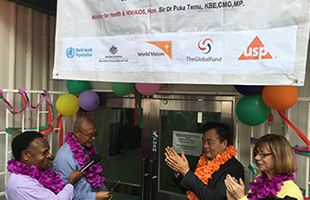
Medicines are critical building blocks of the health system, and the negative consequences are undeniable if the right medicines are not available at the right time, at the right place and in the right quantities. However, ensuring access to medicines must also guarantee quality and safety of medical products.
WHO's Global Surveillance and Monitoring System for substandard and falsified medical products has published a report in 2017 that estimates a 10.5% failure rate in all medical products used in low- and middle-income countries. Global estimates show that more than 72 000 deaths from childhood pneumonia can be attributed to the use of substandard or falsified antibiotics. This figure increases to almost 170 000 deaths if the products have no antibiotic activity at all. While these numbers are staggering, the actual size of the problem may be bigger as many cases are unreported. Not only is this a waste of money for individuals and the whole health system, poor quality medical products can also cause serious illness or even death.
On 30 November 2017, the Medicines Quality Control Laboratory of the National Department of Health (NDOH) was inaugurated. The event was attended by various partners, donors, and key stakeholders in both the private and public sectors, including heads of foreign missions from Fiji and the Solomon Islands. Once in full operation, the facility will allow the Department to perform quality tests for medicines to support the pharmaceutical regulatory activities such as product licensing, post-marketing surveillance, and detection of substandard and falsified medicines.
“There is a big public health and security role this laboratory will play to ensure our people have access to good quality medicines. It has the potential to serve as a regional Centre of Excellence for the Pacific Island Countries”, said Honourable Minister for Health and HIV/AIDS, Sir Dr Puka Temu.
Through the technical support of WHO, the United States Pharmacopeial Convention (USP) was tapped for the capacity building of the laboratory staff. Year-long training covered standard operating procedure (SOP) development, general good laboratory practices, safety in the laboratory, sampling practices and preliminary screening techniques, Quality Management System development and implementation, and instrumentation and analytic testing. The NDOH Medicine Quality Surveillance Framework for practical and risk-based sampling and testing of pharmaceutical products was also finalized in consultation with various stakeholders. WHO also assisted in the sourcing and qualification of laboratory equipment.
WHO Representative to Papua New Guinea, Dr Luo Dapeng, said the Laboratory is aimed to assist the NDoH as the national drug regulatory authority in performing its regulatory and monitoring functions. “Medicines are important not only because of their capacity to treat and prevent disease. It is also because the confidence of the public in the health policies and governance structures is inextricably linked to their confidence in the availability of medicines that are safe and effective,” said Dr Luo.
As the inauguration only signals more work to be accomplished, various stakeholders and development partners signified their continued support to the Laboratory in ensuring good quality medicines for better public health in Papua New Guinea.
